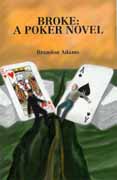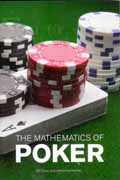
Broke: A Poker Novel
by Brandon Adams
This is a poker novel that looks at three types of players -- any of whom could be based on real-life characters -- and follows them through their high-stakes quest for rame and fortune.

Mathematics of Poker
by Bill Chen
Poker has often been played as a game, by those who have learned it as a game and who have relied on thier ability to play well, to play good hands, and to read other players tells in order to improve thier chances of winning. However, there is now a new set of players who do not rely on these things, but have turned the game of poker into a game that can be won by applying the tools of computer science, and mathematics to thier hands. This new approach relies on quantitative analysis and mathematics. This book strives to take this seemingly difficult task and make it easy and understandable for players with less mathematic knowledge or skill.
Full Tilt Poker Strategy Guideby Michael Craig
Craig has interviewed the golden dozen players big-time competitors Huck Seed, Chris Ferguson, Howard Lederer, Phil Gordon, Gavin Smith, Ted Forrest, David Grey, Mike Matusow, Andy Bloch, Rafe Furst, Richard Brodie and Keith Sexton for special insight into the world of high-stakes tournament poker. This book is very special because it carries original, smoothly arranged material for the highest level of play. It’s like being able to sit in at a small, round-table, specialized seminar and being allowed to ask those key questions few players have the time to answer. Craig pulls that information from the players and arranges it so it can be absorbed, analyzed and applied easily. There are 19 extraordinary chapters that include eight on no-limit play with topics such as the Theory of Leverage; Play Before the Flop; Play After the Flop; Big Stack Play; Short-Stack Play and Online Tournament Strategy. Chapters also focus on pot limit hold‘em; limit hold‘em; Omaha eight or better, and pot limit Omaha. Chapters also discuss seven card stud tournament play.
Read Full Review of 'Full Tilt Poker Strategy Guide'
Read Full Review of 'Full Tilt Poker Strategy Guide'
Get the Edge at Low Limit Texas Hold'emby Bill Burton
Low-Limit Texas Hold'em is the fastest-growing casino poker game. But new player often come to the poker rooms completely unprepared to play a winning game. Even so-called 'veteran' players are often long-term losers at the game because they have never taken the time to study how to play or analyze their own individual games. As author Bill Burton clearly shows in Get the Edge at Low-Limit Texas Hold'em, a savvy low-limit player can turn a profit at this game by exploiting the weaknesses of his or her opponents, and developing his or her own strengths.
Getting Started in Hold'emby Ed Miller
Recently, countless people have started playing poker, hoping to quit their jobs and strike it rich. Sadly, most of these 'professional' players will wind up broke. In this book, noted poker authority Ed Miller who made the leap from beginner to professional in less than a year and a half, guides you onto the winning path. He presents the critical principles that expert players use: preflop hand valuation, domination, betting for value, protecting your hand, semi-bluffing, pot equity, pot odds, implied odds, free card plays, the importance of stack size, why chips change value in tournaments, and much more. Whether you want to play limit, no limit, or tournament hold 'em, this book provides you a solid foundation.
Harrington on Cash Games: Vol. 1 and Vol. 2by Dan Harrington
Dan Harrington begins his insight into success at cash games in Volume 1 with chapters that look basic ideas such as the four principles: expectation, odds and outs, bet types before moving on to the Elements of No-Limit Hold’em and covering stack sizes in relation to hand selection, bet count tables, pot size and pot commitment. Also hand reading. The third major section of the book includes tight-aggressive play before the flop. That’s followed by the same concept on the flop, heads-up, then multiple opponents. Volume 2 continues with chapters that look at tight aggressive play on the turn, tight aggressive play on the river, tells and observations, playing a style that’s loose-aggressive and beating the weak games, bankroll management. Each chapter covers myriad topics such as reasons for betting, balancing bet size, bluffing, leverage, understanding where you stand, playing live games, disguising your play, picking up blinds, applying pressure.
Read Full Review of 'Harrington on Cash Games: Vol. 1 and Vol. 2'
Read Full Review of 'Harrington on Cash Games: Vol. 1 and Vol. 2'
Harrington on Hold'em, Volume 1: Strategic Playby Dan Harrington
Harrington on Hold 'em, Volume 1 is part of a two-book set on playing no-limit hold 'em tournaments written by one of the true masters of the game. If you've ever watched television coverage of the big poker tournaments, you've seen Dan Harrington. Dan, who's always a familiar face at the final table, won the 1995 World Series of Poker championship event and finished fourth in last year's record 2,500+ field.
Read Full Review of 'Harrington on Hold'em, Volume 1: Strategic Play'
Read Full Review of 'Harrington on Hold'em, Volume 1: Strategic Play'
Harrington on Hold'em, Volume 2: The Endgameby Dan Harrington
In volume one of this series, the authors explained how to play the early phases of tournaments when people have plenty of chips and the blinds and antes are small. Here, the focus is on the endgame -- how to play the later phases of a tournament when you have a shot at getting into the money, and when the blinds and antes are growing. Included is information on how to make moves, handle tricky inflection point plays and maneuver when the tourney is down to its last few players. Also included is a chapter on heads-up play a game unto itself, with winning secrets that have been closely guarded.
Read Full Review of 'Harrington on Hold'em, Volume 2: The Endgame'
Read Full Review of 'Harrington on Hold'em, Volume 2: The Endgame'
Harrington on Hold'em, Volume 3: The Workbookby Dan Harrington
In Harrington on Hold 'Em Volume III: The Workbook, serious students of the game-and Dan's teachings-are provided with a series of problems to test how well they grasped the principles in the first two volumes (Volume I: Strategic Play, Volume II: The Endgame). Especially useful is Dan's focus on playing after the flop, a key area that causes difficulties for the aspiring player. A must-have if you play hold 'em.
Read Full Review of 'Harrington on Hold'em, Volume 3: The Workbook'
Read Full Review of 'Harrington on Hold'em, Volume 3: The Workbook'
Hold'em on the Comeby Rolf Slotboom
The author answers such key limit hold'em questions as: What should I do with a flush or straight draw? How should I play with unimproved overcards? How do I count outs, and what are the criteria for counting them as 'full' outs? What is the impact of the size of the pot on your decision? All leading to this all-important question: Do I belong in the pot or not? He provides you with an in-depth analysis of drawing hands leading to a simple but effective system that at all stages will help you 'see where you're at' - which in turn should help your overall results tremendously.
Read Full Review of 'Hold'em on the Come'
Read Full Review of 'Hold'em on the Come'
Hold'em Poker For Advanced Playersby Mason Malmuth
Now considered the most important advanced work on the game today this book offers a tight but aggressive approach for medium limit games. (By medium limits, the authors mean $10-20 and on up to $30-60). Divided into six major sections, including discussions of The First Two Cards in early, middle and late position; live blinds, late position blind; Strategic Concepts; semi-bluffing, the free card, slow playing, check raising. This revised edition includes more than 100 additional pages that cover loose games, short-handed games, playing the first two cards, semi-bluffing, the free card, inducing bluffs, staying with a draw, playing when a pair flops, playing trash hands, desperation bets, wild games, reading hands, and psychology.
Read Full Review of 'Hold'em Poker For Advanced Players'
Read Full Review of 'Hold'em Poker For Advanced Players'
Hold'em Wisdom For All Playersby Daniel Negreanu
One of today's superstar poker players, Negreanu has written a book for both beginners and novice players of Texas hold'em. He has compiled 50 quick sections that focus on key winning concepts to help make the winning game both easy and fast. Some of the chapters include: 5 Reasons Why You Lose; Top Ten Rookie Mistakes; What's The Big Deal About Big Slick; Be Careful What You Learn On TV.
Read Full Review of 'Hold'em Wisdom For All Players'
Read Full Review of 'Hold'em Wisdom For All Players'
How to Beat Internet Casinos and Poker Roomsby Arnold Snyder
Who better to teach you how to beat the online casino and poker room than a man who has been beating land-based casinos (at blackjack) for decades? Snyder reveals how you can make money olnline without any special skills, mathematical ability, super memory, difficult systems to work or eve a big bankroll. Looking at this as easy money, he explains methods of play that can multiplay your bankroll many times with little risk. The 2/3 of the book cover all the major games and promotions while the last third focuses on poker.
How to Spot a Liarby Gregory Hartley
Author Greg Hartley is a decorated military interrogator who has used the techniques in How to Spot a Liar for 16 years to get the truth from enemy combatants. He has successfully applied them to project management and in contract negotiations, to resolve conflict and prevail. Now he shares this scientific process with you so you can use it every day. Who needs How to Spot a Liar? Anyone with a cheating spouse or manipulative boss. Anyone conducting job interviews or cold-calling prospective customers. Lawyers who need to 'read' witnesses or jurors. Anyone trying to survive the dating scene or faced with a string of business meetings with clients. Anyone who has teenagers at home or works on Capitol Hill. Anyone whose success and happiness depends on clear interaction with others. And, most importantly, anyone who wants to become just a bit more inscrutable at the poker table!
Read Full Review of 'How to Spot a Liar'
Read Full Review of 'How to Spot a Liar'
How to Turn Your Poker Playing Into a Businessby Ann-Margaret Johnston
Here's a book devoted to dealing with U.S. taxes and poker, written by a tax-expert and poker player. Ann-Margaret Johnston (CPS) shows you step-by-step ways to turn poker into a business andhow to handle the expenses and deductions that go with your business.
Read Full Review of 'How to Turn Your Poker Playing Into a Business'
Read Full Review of 'How to Turn Your Poker Playing Into a Business'
How to Win the Championshipby T.J. Cloutier
If anyone every knew how to get to the final table of a major poker tournament, it is T.J. Cloutier. With 59 titles and 39 final-table appearances at the World Series of Poker, Cloutier becamse one of the most noted players in the business. Here he reveals his strategies for outmaneuvering opponents at the final table beginning with the difference between good and great players. He then follows with basic principles for getting to the final table, spending an entire chapter on handling yourself when you're just one table away from the money. Before finishing with eight critical tips, he adds his advice on making deals, dead money, modesty, bad beats, lame laments and dealing with the new tournament poker.
Read Full Review of 'How to Win the Championship'
Read Full Review of 'How to Win the Championship'
[ << previous 25 poker books ] [ next 25 poker books >> ]
















